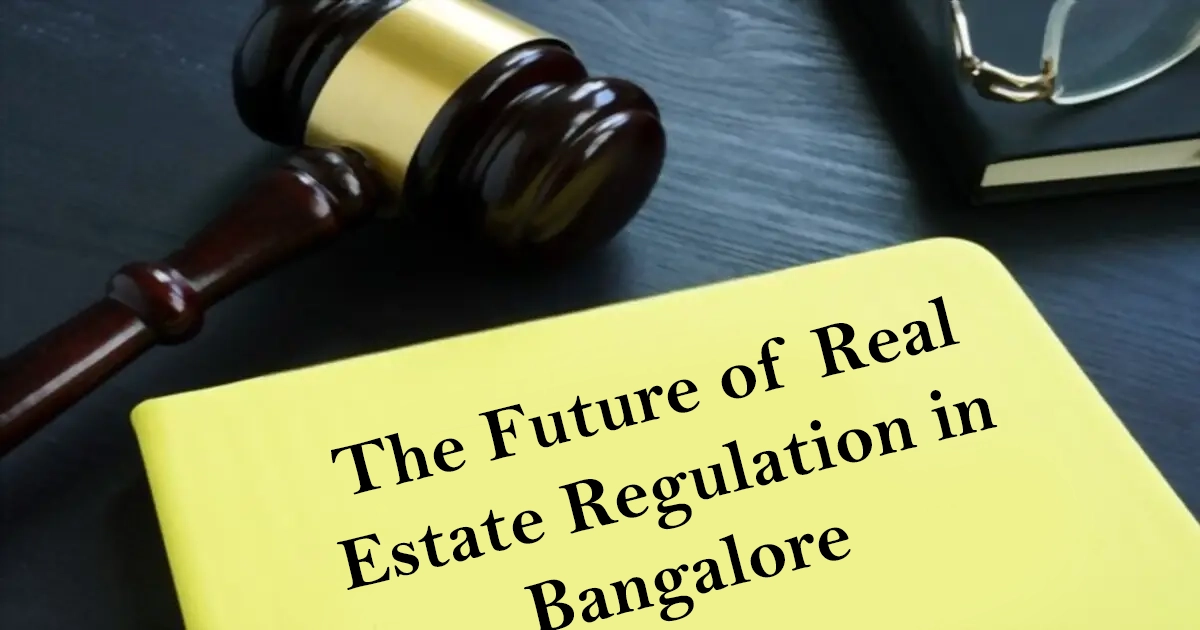The Future of Real Estate Regulation in Bangalore
Read latest blogs and articles from Housystan

The Information mentioned here was last updated on:
29/1/2026The Future of Real Estate Regulation in Bangalore
The real estate market in Bangalore is as dynamic and ever-evolving as the city itself. Known for its booming IT sector and burgeoning population, Bangalore's growth has contributed to a vibrant real estate landscape. However, as the industry expands, so does the need for robust regulations to ensure sustainable development and consumer protection. This blog delves into the future of real estate regulation in Bangalore, exploring upcoming trends, potential regulatory changes, and the impact these might have on the market and its stakeholders.
The Current Regulatory Landscape
- Verified Tenants/Buyers
- Unlimited Property Listing
- Zero subscription/charges fee
RERA: A Game Changer
- The Real Estate (Regulation and Development) Act, commonly known as RERA, marked a significant shift when it was introduced in 2016. It aimed to increase transparency, ensure timely project deliveries, and protect homebuyer interests.
- Key Features:
- Mandatory registration of projects.
- Regular updating of project status.
- Establishment of a Real Estate Regulatory Authority in each state.
GST and Real Estate
- The introduction of the Goods and Services Tax (GST) streamlined the indirect tax structure for real estate transactions.
- It replaced multiple taxes with a single, unified tax system, thereby simplifying the home-buying process and making pricing more transparent.
Affordable Housing Push
- Government initiatives to promote affordable housing have seen regulatory measures providing incentives for developers.
- These measures include reduced tax rates and simplified approval processes, benefiting both developers and end consumers.
Emerging Trends in Real Estate Regulation
Technology and Real Estate
- The adoption of technology in real estate, such as blockchain for property records, is expected to transform the regulatory framework.
- Benefits of integrating technology include:
- Enhanced transparency and security.
- Streamlined documentation processes.
- Reduction in fraudulent transactions.
Green Building Norms
- Sustainable development is becoming a focus within real estate regulations, with an emphasis on eco-friendly building practices.
- Future regulatory changes might include stricter guidelines on energy efficiency, waste management, and water conservation.
Focus on Homebuyer Protection
- Emerging discussions around extending further protections to homebuyers could lead to new regulations.
- Potential changes may address:
- Clearer terms in builder-buyer agreements.
- Enhanced conflict resolution mechanisms.
- Stricter penalties for project delays.
Challenges in Implementing New Regulations
Bureaucratic Hurdles
- Bureaucratic delays in approvals and clearances can stifle regulatory changes.
- Streamlining the approval process is crucial for implementing effective real estate regulations quickly and efficiently.
Balancing Growth and Regulation
- Ensuring that regulations support growth without stifling the market is a delicate balance. Over-regulation could slow down project launches and increase costs for developers.
Need for a Unified Framework
- The lack of a unified regulatory framework across states can lead to inconsistencies and confusion.
- Efforts towards standardizing regulations across the country could benefit the Bangalore real estate market.
The Impact on Stakeholders
Homebuyers
- Stricter regulations are anticipated to enhance homebuyer confidence by ensuring better quality projects and timely completion.
- Increased transparency from technologically advanced systems provides reassurance against fraud.
Developers
- Developers might face initial challenges with compliance and increased costs but will benefit from streamlined processes and the potential for a more sustainable real estate environment.
- Incentives for sustainable practices could encourage innovation and eco-friendly developments.
Investors
- Investors can expect a more stable market with the implementation of tighter regulations.
- Improved transparency and accountability will likely lead to increased investor interest, boosting the market.
Real Estate Market Dynamics
Urbanization and Demand
- Bangalore's continued urbanization will keep the demand for residential and commercial spaces high.
- Regulatory changes aimed at facilitating affordable housing development will likely support the growing population's needs.
Infrastructure Improvements
- As the city expands, infrastructure improvements are essential. Future regulations may include mandates for developers to contribute to or incorporate infrastructure development in their projects.
Digital Transformation
- Digital transformation in real estate, through initiatives like e-registration of properties, will align with future regulations to support seamless transactions and data accessibility.
The future of real estate regulation in Bangalore points towards a harmonious blend of technology, sustainability, and protection for all stakeholders. As the regulations evolve, the emphasis will likely remain on creating a transparent, efficient, and dynamic market that continues to thrive amidst the challenges of growth and development. Leveraging technology and innovation will undoubtedly play a crucial role in this transformative journey. Stay tuned to witness how the regulatory landscape shapes the future of Bangalore's real estate market.